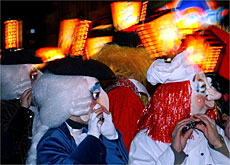
Swiss carnival season starts with a bang

The Thursday before Ash Wednesday – or “Dirty Thursday” as it’s known in parts of Switzerland - marks the start of another frenzied carnival season in many towns across the country.
Carnival is a licence for the normally well-behaved Swiss to let their hair down and celebrate the festival in their own unique way.
In Lucerne, dozens of costumed brass bands took their signal from a pre-dawn gun salute on Thursday to strike the fist dissonant chords of marches and pop songs, and begin parading through the streets and alleys of the old town.
The unique musical combination is known in Swiss-German as “Guggenmusik”.
The music may be intentionally out-of-tune, but the seemingly anarchic proceedings never get out-of-hand and always run on schedule.
Dirty Thursday begins in Lucerne and some other German-speaking towns at precisely 5am. The well-behaved mayhem that follows is known as “Fasnacht” and lasts until Ash Wednesday the following week.
Out of sync
The best-known Swiss carnival is Basel’s Fasnacht, which is out of sync with the rest of Switzerland since it begins on the Monday after Ash Wednesday.
The post-Lenten start is the Protestant city’s way of mocking the Catholic carnival tradition of feasting and making merry before the 40-day fast.
On this day at exactly 4am, the streetlights in the town on the Rhine go down and the curtain goes up on the “Morgestraich” parade.
Large lanterns hoisted on wagons or poles light the path of Basel’s masked drummers and piccolo players.
Lampoonery
The lanterns are illustrated with scenes lampooning events which struck a chord with the Swiss during the previous year.
While in Lucerne and other Swiss carnivals anyone can paint their face and join in the festivities, participation in Basel’s three-day carnival is tightly controlled by powerful “Fasnacht cliques”.
Guggenmusik groups ensure the residents of usually sedate alpine villages are kept dancing late into the night during Fasnacht.
And in the Lötschental valley in canton Valais, carnival has helped revive a pagan custom, the “Tschäggättä” (piebald).
Sinister masks
According to tradition, costumed Tschäggättä figures wearing sinister wooden masks roam through the valley under the cover of darkness, preying on unsuspecting victims.
The Tschäggättä have had to share the stage in recent times with colourful and boisterous Guggenmusik bands, a tradition foreign to the valley, but the Tschäggättä custom is enjoying a revival among the young people of the isolated region (see video).
The key of the city of Bellinzona is handed over to “King Rabadan” on the evening of Dirty Thursday to launch carnival in the capital of the Italian-speaking canton of Ticino.
Traditionally, carnival in Ticino was a time when the rich had to ensure that the poor had enough food to fill their bellies before having to fast at Lent.
While flour soup is served up in great quantities at many carnivals in German-speaking Switzerland, risotto is the meal of choice in Ticino.
Payerne hosts the largest carnival in French-speaking Switzerland.
The four-day event includes processions of spectacular floats and costume balls.
swissinfo, Dale Bechtel
Carnival traditionally lasts from Dirty Thursday to Ash Wednesday, the start of Lent.
Lent is the Christian fast lasting 40 days from Ash Wednesday to Easter.
Basel’s carnival breaks with tradition by beginning on the Monday following Ash Wednesday.
The best-known Swiss carnivals are held in Basel and Lucerne.
Black humour has been part of carnival since the Middle Ages when the lower classes seized the opportunity to mock their rulers from the safety of their disguises.
The authorities in many Swiss towns tried to ban the wearing of costumes and on at least three occasions carnival led to open rebellion.

In compliance with the JTI standards
More: SWI swissinfo.ch certified by the Journalism Trust Initiative





























You can find an overview of ongoing debates with our journalists here . Please join us!
If you want to start a conversation about a topic raised in this article or want to report factual errors, email us at english@swissinfo.ch.